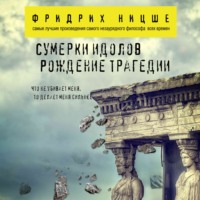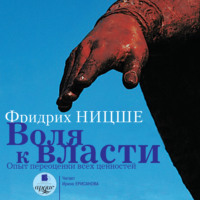 полная версия
полная версияThe Dawn of Day
239
A Hint to Moralists. – Our musicians have made a great discovery. They have found out that interesting ugliness is possible even in their art; this is why they throw themselves with such enthusiastic intoxication into this ocean of ugliness, and never before has it been so easy to make music. It is only now that we have got the general, dark-coloured background, upon which every luminous ray of fine music, however faint, seems tinged with golden emerald lustre; it is only now that we dare to inspire our audience with feelings of impetuosity and indignation, taking away their breath, so to speak, in order that we may afterwards, in an interval of restful harmony, inspire them with a feeling of bliss which will be to the general advantage of a proper appreciation of music.
We have discovered the contrast: it is only now that the strongest effects are possible – and cheap. No one bothers any more about good music. But you must hurry up! When any art has once made this discovery, it has but a short space of time to live. – Oh, if only our thinkers could probe into the depths of the souls of our musicians when listening to their music! How long we must wait until we again have an opportunity of surprising the inward man in the very act of his evil doing, and his innocence of this act! For our musicians have not the slightest suspicion that it is their own history, the history of the disfigurement of the soul, which they are transposing into music. In former times a good musician was almost forced by the exigencies of his art to become a good man – and now!
240
The Morality of the Stage. – The man who imagines that the effect of Shakespeare's plays is a moral one, and that the sight of Macbeth irresistibly induces us to shun the evil of ambition, is mistaken, and he is mistaken once more if he believes that Shakespeare himself thought so. He who is truly obsessed by an ardent ambition takes delight in beholding this picture of himself; and when the hero is driven to destruction by his passion, this is the most pungent spice in the hot drink of this delight. Did the poet feel this in another way? How royally and with how little of the knave in him does his ambitious hero run his course from the moment of his great crime! It is only from this moment that he becomes “demoniacally” attractive, and that he encourages similar natures to imitate him. – There is something demoniacal here: something which is in revolt against advantage and life, in favour of a thought and an impulse. Do you think that Tristan and Isolde are warnings against adultery, merely because adultery has resulted in the death of both of them? This would be turning poets upside down, these poets who, especially Shakespeare, are in love with the passions in themselves, and not less so with the readiness for death which they give rise to: this mood in which the heart no more clings to life than a drop of water does to the glass. It is not the guilt and its pernicious consequences which interests these poets – Shakespeare as little as Sophocles (in the Ajax, Philoctetes, Œdipus) – however easy it might have been in the cases just mentioned to make the guilt the lever of the play, it was carefully avoided by the poets.
In the same way the tragic poet by his images of life does not wish to set us against life. On the contrary, he exclaims; “It is the charm of charms, this exciting, changing, and dangerous existence of ours, so often gloomy and so often bathed in sun! Life is an adventure – whichever side you may take in life it will always retain this character!” – Thus speaks the poet of a restless and vigorous age, an age which is almost intoxicated and stupefied by its superabundance of blood and energy, in an age more evil than our own: and this is why it is necessary for us to adapt and accommodate ourselves first to the purpose of a Shakespearian play, that is, by misunderstanding it.
241
Fear and Intelligence. – If that which is now expressly maintained is true, viz. that the cause of the black pigment of the skin must not be sought in light, might this phenomenon perhaps be the ultimate effect of frequent fits of passion accumulated for century after century (and an afflux of blood under the skin)? while in other and more intelligent races the equally frequent spasms of fear and blanching may have resulted in the white colour of the skin? – For the degree of timidity is the standard by which the intelligence may be measured; and the fact that men give themselves up to blind anger is an indication that their animal nature is still near the surface, and is longing for an opportunity to make its presence felt once more. Thus a brownish-grey would probably be the primitive colour of man – something of the ape and the bear, as is only proper.
242
Independence. – Independence (which in its weakest form is called “freedom of thought”) is the type of resignation which the tyrannical man ends by accepting – he who for a long time had been looking for something to govern, but without finding anything except himself.
243
The two Courses. – When we endeavour to examine the mirror in itself we discover in the end that we can detect nothing there but the things which it reflects. If we wish to grasp the things reflected we touch nothing in the end but the mirror. – This is the general history of knowledge.
244
Delight in Reality. – Our present inclination to take delight in reality – for almost every one of us possesses it – can only be explained by the fact that we have taken delight in the unreal for such a long time that we have got tired of it. This inclination in its present form, without choice and without refinement, is not without danger – its least danger is its want of taste.
245
The Subtlety of the Feeling of Power. – Napoleon was greatly mortified at the fact that he could not speak well, and he did not deceive himself in this respect: but his thirst for power, which never despised the slightest opportunity of showing itself, and which was still more subtle than his subtle intellect, led him to speak even worse than he might have done. It was in this way that he revenged himself upon his own mortification (he was jealous of all his emotions because they possessed power) in order to enjoy his autocratic pleasure.
He enjoyed this pleasure a second time in respect to the ears and judgment of his audience, as if it were good enough for them to be addressed in this way. He even secretly enjoyed the thought of bewildering their judgment and good taste by the thunder and lightning of his highest authority – that authority which lies in the union of power and genius – while both his judgment and his good taste held fast proudly and indifferently to the truth that he did not speak well. – Napoleon, as the complete and fully developed type of a single instinct, belongs to ancient humanity, whose characteristic – the simple construction and ingenious development and realisation of a single motive or a small number of motives – may be easily enough recognised.
246
Aristotle and Marriage. – Insanity makes its appearance in the children of great geniuses, and stupidity in those of the most virtuous – so says Aristotle. Did he mean by this to invite exceptional men to marry?
247
The Origin of a bad Temperament. – Injustice and instability in the minds of certain men, their disordered and immoderate manner, are the ultimate consequences of the innumerable logical inexactitudes, superficialities, and hasty conclusions of which their ancestors have been guilty. Men of a good temperament, on the other hand, are descended from solid and meditative races which have set a high value upon reason – whether for praiseworthy or evil purposes is of no great importance.
248
Dissimulation as a Duty. – Kindness has been best developed by the long dissimulation which endeavoured to appear as kindness: wherever great power existed the necessity for dissimulation of this nature was recognised – it inspires security and confidence, and multiplies the actual sum of our physical power. Falsehood, if not actually the mother, is at all events the nurse of kindness. In the same way, honesty has been brought to maturity by the need for a semblance of honesty and integrity: in hereditary aristocracies. The persistent exercise of such a dissimulation ends by bringing about the actual nature of the thing itself: the dissimulation in the long run suppresses itself, and organs and instincts are the unexpected fruits in this garden of hypocrisy.
249
Who, then, is ever Alone. – The faint-hearted wretch does not know what it means to be lonely. An enemy is always prowling in his tracks. Oh, for the man who could give us the history of that subtle feeling called loneliness!
250
Night and Music. – It was only at night time, and in the semi-obscurity of dark forests and caverns, that the ear, the organ of fear, was able to develop itself so well, in accordance with the mode of living of the timid – that is, the longest human epoch which has ever yet existed: when it is clear daylight the ear is less necessary. Hence the character of music, which is an art of night and twilight.
251
Stoical. – The Stoic experiences a certain sense of cheerfulness when he feels oppressed by the ceremonial which he has prescribed for himself: he enjoys himself then as a ruler.
252
Consider. – The man who is being punished is no longer he who has done the deed. He is always the scapegoat.
253
Appearance. – Alas! what must be best and most resolutely proved is appearance itself; for only too many people lack eyes to observe it. But it is so tiresome!
254
Those who Anticipate. – What distinguishes poetic natures, but is also a danger for them, is their imagination, which exhausts itself in advance: which anticipates what will happen or what may happen, which enjoys and suffers in advance, and which at the final moment of the event or the action is already fatigued. Lord Byron, who was only too familiar with this, wrote in his diary: “If ever I have a son he shall choose a very prosaic profession – that of a lawyer or a pirate.”
255
Conversation on Music. —
A. What do you say to that music?
B. It has overpowered me, I can say nothing about it. Listen! there it is beginning again.
A. All the better! This time let us do our best to overpower it. Will you allow me to add a few words to this music? and also to show you a drama which perhaps at your first hearing you did not wish to observe?
B. Very well, I have two ears and even more if necessary; move up closer to me.
A. We have not yet heard what he wishes to say to us, up to the present he has only promised to say something – something as yet unheard, so he gives us to understand by his gestures, for they are gestures. How he beckons! How he raises himself up! How he gesticulates! and now the moment of supreme tension seems to have come to him: two more fanfares, and he will present us with his superb and splendidly-adorned theme, rattling, as it were, with precious stones.
Is it a handsome woman? or a beautiful horse? Enough, he looks about him as if enraptured, for he must assemble looks of rapture. It is only now that his theme quite pleases him: it is only now that he becomes inventive and risks new and audacious features. How he forces out his theme! Ah, take care! – he not only understands how to adorn, but also how to gloss it over! Yes, he knows what the colour of health is, and he knows how to make it up, – he is more subtle in his self-consciousness than I thought. And now he is convinced that he has convinced his hearers; he sets off his impromptus as if they were the most important things under the sun: he points to his theme with an insolent finger as if it were too good for this world. – Ah, how distrustful he is! He is afraid we may get tired! – that is why he buries his melody in sweet notes. – Now he even appeals to our coarser senses that he may excite us and thus get us once again into his power. Listen to him as he conjures up the elementary force of tempestuous and thundering rhythms!
And now that he sees that these things have captivated our attention, strangle us, and almost overwhelm us, he once again ventures to introduce his theme amidst this play of the elements in order to convince us, confused and agitated as we are, that our confusion and agitation are the effects of his miraculous theme. And from now onwards his hearers believe in him: as soon as the theme is heard once more they are reminded of its thrilling elementary effects. The theme profits by this recollection – now it has become demoniacal! What a connoisseur of the soul he is! He gains command over us by all the artifices of the popular orator. But the music has stopped again.
B. And I am glad of it; for I could no longer bear listening to your observations! I should prefer ten times over to let myself be deceived to knowing the truth once after your version.
A. That is just what I wished to hear from you. The best people now are just like you: you are quite content to let yourselves be deceived. You come here with coarse, lustful ears, and you do not bring with you your conscience of the art of listening. On the way here you have cast away your intellectual honesty, and thus you corrupt both art and artists. Whenever you applaud and cheer you have in your hands the conscience of the artists – and woe to art if they get to know that you cannot distinguish between innocent and guilty music! I do not indeed refer to “good” and “bad” music – we meet with both in the two kinds of music mentioned! but I call innocent music that which thinks only of itself and believes only in itself, and which on account of itself has forgotten the world at large – this spontaneous expression of the most profound solitude which speaks of itself and with itself, and has entirely forgotten that there are listeners, effects, misunderstandings and failures in the world outside. In short, the music which we have just heard is precisely of this rare and noble type; and everything I said about it was a fable – pardon my little trick if you will!
B. Oh, then you like this music, too? In that case many sins shall be forgiven you!
256
The Happiness of the Evil Ones. – These silent, gloomy, and evil men possess a peculiar something which you cannot dispute with them – an uncommon and strange enjoyment in the dolce far niente; a sunset and evening rest, such as none can enjoy but a heart which has been too often devoured, lacerated, and poisoned by the passions.
257
Words Present in our Minds. – We always express our thoughts with those words which lie nearest to hand. Or rather, if I may reveal my full suspicion; at every moment we have only the particular thought for the words that are present in our minds.
258
Flattering the Dog. – You have only to stroke this dog's coat once, and he immediately splutters and gives off sparks like any other flatterer – and he is witty in his own way. Why should we not endure him thus?
259
The Quondam Panegyrist. – “He has now become silent now in regard to me, although he knows the truth and could tell it; but it would sound like vengeance – and he values truth so highly, this honourable man!”
260
The Amulet of Dependent Men. – He who is unavoidably dependent upon some master ought to possess something by which he can inspire his master with fear, and keep him in check: integrity, for example, or probity, or an evil tongue.
261
Why so Sublime! – Oh, I know them well this breed of animals! Certainly it pleases them better to walk on two legs “like a god” – but it pleases me better when they fall back on their four feet. This is incomparably more natural for them!
262
The Demon of Power. – Neither necessity nor desire, but the love of power, is the demon of mankind. You may give men everything possible – health, food, shelter, enjoyment – but they are and remain unhappy and capricious, for the demon waits and waits; and must be satisfied. Let everything else be taken away from men, and let this demon be satisfied, and then they will nearly be happy – as happy as men and demons can be; but why do I repeat this? Luther has already said it, and better than I have done, in the verses:
“And though they take our life,Goods, honour, children, wife,Yet is their profit small,These things shall vanish all,The Kingdom it remaineth.”The Kingdom! there it is again!7
263
Contradiction Incarnate and Animated. – There is a physiological contradiction in what is called genius: genius possesses on the one hand a great deal of savage disorder and involuntary movement, and on the other hand a great deal of superior activity in this movement. Joined to this a genius possesses a mirror which reflects the two movements beside one another, and within one another, but often opposed to one another. Genius in consequence of this sight is often unhappy, and if it feels its greatest happiness in creating, it is because it forgets that precisely then, with the highest determinate activity, it does something fantastic and irrational (such is all art) and cannot help doing it.
264
Deceiving One's Self. – Envious men with a discriminating intuition endeavour not to become too closely acquainted with their rivals in order that they may feel themselves superior to them.
265
There is a Time for the Theatre. – When the imagination of a people begins to diminish, there arises the desire to have its legends represented on the stage: it then tolerates the coarse substitutes for imagination. In the age of the epic rhapsodist, however, the theatre itself, and the actor dressed up as a hero, form an obstacle in the path of the imagination instead of acting as wings for it – too near, too definite, too heavy, and with too little of dreamland and the flights of birds about them.
266
Without Charm. – He lacks charm and knows it. Ah, how skilful he is in masking this defect! He does it by a strict virtue, gloomy looks, and acquired distrust of all men, and of existence itself; by coarse jests, by contempt for a more refined manner of living, by pathos and pretensions, and by a cynical philosophy – yea, he has even developed into a character through the continual knowledge of his deficiency.
267
Why so Proud? – A noble character is distinguished from a vulgar one by the fact that the latter has not at ready command a certain number of habits and points of view like the former: fate willed that they should not be his either by inheritance or by education.
268
The Orator's Scylla and Charybdis. – How difficult it was in Athens to speak in such a way as to win over the hearers to one's cause without repelling them at the same time by the form in which one's speech was cast, or withdrawing their attention from the cause itself by this form! How difficult it still is to write thus in France!
269
Sick People and Art. – For all kinds of sadness and misery of soul we should first of all try a change of diet and severe manual labour; but in such cases men are in the habit of having recourse to mental intoxicants, to art for example – which is both to their own detriment and that of art! Can you not see that when you call for art as sick people you make the artists themselves sick?
270
Apparent Toleration. – Those are good, benevolent, and rational words on and in favour of science, but, alas! I see behind these words your toleration of science. In a corner of your inmost mind you think, in spite of all you say, that it is not necessary for you, that it shows magnanimity on your part to admit and even to advocate it, more especially as science on its part does not exhibit this magnanimity in regard to your opinion! Do you know that you have no right whatever to exercise this toleration? that this condescension of yours is an even coarser disparagement of science than any of that open scorn which a presumptuous priest or artist might allow himself to indulge in towards science? What is lacking in you is a strong sense for everything that is true and actual, you do not feel grieved and worried to find that science is in contradiction to your own sentiments, you are unacquainted with that intense desire for knowledge ruling over you like a law, you do not feel a duty in the need of being present with your own eyes wherever knowledge exists, and to let nothing that is “known” escape you. You do not know that which you are treating with such toleration! and it is only because you do not know it that you can succeed in adopting such a gracious attitude towards it. You, forsooth, would look upon science with hatred and fanaticism if it for once cast its shining and illuminating glance upon you! What does it matter to us, then, if you do exhibit toleration – and towards a phantom! and not even towards us! – and what do we matter!
271
Festive Moods. – It is exactly those men who aspire most ardently towards power who feel it indescribably agreeable to be overpowered! to sink suddenly and deeply into a feeling as into a whirlpool! To suffer the reins to be snatched out of their hand, and to watch a movement which takes them they know not where! Whatever or whoever may be the person or thing that renders us this service, it is nevertheless a great service: we are so happy and breathless, and feel around us an exceptional silence, as if we were in the most central bowels of the earth. To be for once entirely powerless! the plaything of the elementary forces of nature! There is a restfulness in this happiness, a casting away of the great burden, a descent without fatigue, as if one had been given up to the blind force of gravity.
This is the dream of the mountain climber, who, although he sees his goal far above him, nevertheless falls asleep on the way from utter exhaustion, and dreams of the happiness of the contrast – this effortless rolling down hill. I describe happiness as I imagine it to be in our present-day society, the badgered, ambitious society of Europe and America. Now and then they wish to fall back into impotence – this enjoyment is offered them by wars, arts, religions, and geniuses. When a man has temporarily abandoned himself to a momentary impression which devours and crushes everything – and this is the modern festive mood – he afterwards becomes freer, colder, more refreshed, and more strict, and again strives tirelessly after the contrary of all this: power.
272
The Purification of Races. – It is probable that there are no pure races, but only races which have become purified, and even these are extremely rare.8 We more often meet with crossed races, among whom, together with the defects in the harmony of the bodily forms (for example when the eyes do not accord with the mouth) we necessarily always find defects of harmony in habits and appreciations. (Livingstone heard some one say, “God created white and black men, but the devil created the half-castes.”)
Crossed races are always at the same time crossed cultures and crossed moralities: they are, as a rule, more evil, cruel, and restless. Purity is the final result of innumerable adjustments, absorptions, and eliminations; and progress towards purity in a race is shown by the fact that the latent strength in the race is more and more restricted to a few special functions, whilst it formerly had to carry out too many and often contradictory things. Such a restriction will always have the appearance of an impoverishment, and must be judged with prudence and moderation. In the long run, however, when the process of purification has come to a successful termination, all those forces which were formerly wasted in the struggle between the disharmonious qualities are at the disposal of the organism as a whole, and this is why purified races have always become stronger and more beautiful. – The Greeks may serve us as a model of a purified race and culture! – and it is to be hoped that some day a pure European race and culture may arise.









